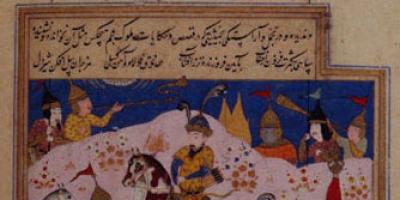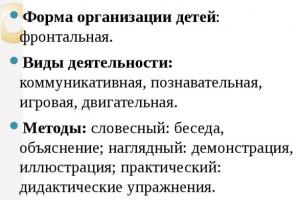Sections: Russian language
Lesson type: learning new material.
Lesson Objectives:
- Educational:
- repeat active and passive participles and their differences;
- repeat the formation and spelling of active participles of the present and past tense, passive participles of the present tense;
- repeat the dependence of the number of participial forms on the transitivity-intransitivity category of the verb and its type;
- introduce ways of forming passive past participles.
- development and improvement of the ability to distinguish between active and passive participles;
- improving the ability to form real and passive participles by solving spelling problems (choosing a vowel in participle suffixes);
- developing the ability to work with diagrams, textbook references, and tables;
- development of logical thinking;
- development of students' creative abilities.
- nurturing curiosity,
- culture of mental work;
- formation of independent thinking and self-control skills.
Equipment:
- Russian language: Practice. 7th grade: Manual for general education. institutions/ S.N. Pimenova, A.P. Eremeeva, A.Yu. Kupalova and others; Ed. S.N. Pimenova. - 10th ed., stereotype. – M.: Bustard, 2003. – 240 pp.: ill.
- Multimedia products (Program 1C: School. Hello, Communion! / edited by T. Rick).
- Projector.
- Portable board.
- Printed tables, colored circles to indicate group.
During the classes
1. Organizational moment.
Before the start of the lesson, the teacher distributes yellow and red tokens to the students in the class, which makes it possible to divide the class into two groups: those with good and weaker basic training.
Communicating the topic and goals of the lesson (mobilizing attention).
Teacher: Guys, today in the lesson we will repeat the formation and spelling of active participles of the present and past tense and passive participles of the present tense and learn how passive past participles are formed.
2. Homework.
Increasing educational motivation; creating a situation in which students are aimed at active work in the lesson.
Teacher: Write down your homework - § 137, ex. 150. Let's read the task for the exercise. You will need to determine from which verbs these passive past participles are formed. And the material from today’s lesson will help you complete the exercise.
3. Updating students' knowledge.
Teacher: Guys, you remember that Communion and his friends were in trouble. Robber Joe stole the magic amulet of Communion, without which our hero will not be able to become an independent part of speech. And to find this amulet, you need to pass various tests. Here is one of them in front of you.
3.1. Individual work in pairs.
Working with a computer program.
Exercise. Distribute active and passive participles into columns (Fig. 1).
Figure 1 You can see.
3.2. Frontal work.
Teacher: But that is not all. Communion was upset when they brought him a table that he had to fill out. But our hero is sure that you will help him.
Exercise. Fill in the blanks in the table where possible, except for the last column
(Table 1).
Table 1
Active participles |
Passive participles |
|||
present time |
past time |
present time |
past time |
|
(transitional type) |
chita…. th |
|||
(transitional owl species) decide |
||||
(intransitive nes. type) |
nap...yikes |
|||
(intransitive owl species)take a nap |
||||
Independent work of students to fill out the table.
Self-test of completing the task using the key (Table 2) (demonstrated through the projector).
Table 2. Key
Active participles |
Passive participles |
|||
present time |
past time |
present time |
past time |
|
reading |
read |
readable |
||
(transitional owl species) decide |
decided |
|||
(intransitive nes. type)nap |
dormant |
dozing |
||
(intransitive owl species) take a nap |
dozed off |
|||
Teacher: Why are some cells left empty in our table? (Not all verbs can form these participle forms.) What does this depend on? (From the transitivity-intransitivity of the verb and its type).
4. New material.
4.1. Preparation for learning new material, increasing learning motivation.
Teacher: Look at the table, we have one column left blank. How are passive past participles formed? The reference note in the textbook will help you answer this question.
4.2. Organization of independent work of students with reference notes from the textbook.
Open your textbook to page 57.
Exercise. Using supporting material, tell how and with what help passive past participles are formed.
Checking progress.
Students formulate a conclusion based on the reference record.
Passive past participles are formed from the stem of the infinitive or the stem of the past tense of the verb using the suffixes -enn-, -nn, -t-.
4.3. Primary consolidation.
Training exercise (shown by the teacher on the board, then students continue to work under the guidance of the teacher).
Exercise. Form passive past participles from these verbs and highlight suffixes.
Sign - signed, see - seen, dispel - scattered, see through - bit through, break - broken.
Draw students' attention to writing a vowel before participle suffixes.
5. Consolidation of the studied material.
Differentiated tasks for groups.
Teacher: Raise your hands those who received a yellow circle - group 1. You sit down at the computers and complete the following task: form passive past participles from these verbs. Next, independently check whether the work was completed correctly by clicking the “confirm answer” button (Fig. 2). If you do everything correctly, raise your hand so that the teacher marks the work completed.
Figure 2 You can see.
Students who quickly completed the task can continue to work on the computer until the second group finishes their work (Fig. 3).
Figure 3 You can see.
Group 2 – exercise 149.
Exercise. Form passive past participles using the indicated suffixes.
The Russian language is a lot of rules that you need not just to know, but to understand in order to write correctly and speak beautifully. “Partitions” is one of the important topics, having mastered which, you can learn laconic but expressive speech. The past participle is especially difficult. Although, if you approach the study thoughtfully, you can figure it out.
The difference between and without them
Compare the sentences: one with and the second - complex with a subordinate clause. The first option is more laconic, beautiful and poetic than the second.
It is especially important to be able to replace subordinate clauses for copywriters when fulfilling orders where the accuracy of the “watery” texts is indicated, because introductory words, prepositions, conjunctions and allied words are precisely included in the list of “watery” expressions.
Participle as part of speech
Many people have difficulty understanding the features of this part of speech. Children even compose funny rhymes about this:
Unlimited misfortune -
Study, inflect the sacrament!
I will suffer thoroughly,
For now I'll start with the passive
Distinguish from reality.
What is even more painful?
From the school course we know that the participle is not at all simple because it has the properties of both a verb and an adjective. From the verb, this part of speech has aspect and tense, and from the adjective - gender, number, case, full or short form. There is also an active past participle and a passive participle. It also received this function - voice - from the verb.

Communion time
Usually a distinction is made between past and present tenses in participles. It is clear that to determine this category, one should understand the semantic feature of the word, think about whether the action is happening at the moment or has already happened. There is a clear answer to the question of what a past participle is: the meaning of the word indicates that it demonstrates a result, not a process. You can compare two options: “a running boy” and “a running boy.” In the first case, the present tense is used, because the child is performing an action at the moment. In the second case, the child has already finished running and is standing in front of us. Therefore, the tense of the participle is past.

Active voice of participles
How to distinguish the active past participle from the passive? It's simple! First, you need to think about the meaning of the statement. Let's look at this with examples.

Passive participle in the past tense
The verb form we are considering can denote an action that someone else performs with an object. Then the past participle is in the passive voice. To understand this more fully, consider examples.
- “The dress the girl wore suited her so well that everyone around looked at the baby with a smile of tenderness.” From the context it is clear that the outfit itself cannot do anything. This means that “put on” is a passive participle, because it is the girl who produces the action, because she is the one who put on the dress.
- “The dishes washed by Tanya sparkled clean.” And here it is clear that someone had done some work before the moment described - the plates themselves could not clear themselves of the remnants of food. Therefore, the word "washed" is a passive past participle.

What are the main conditions for spelling suffixes for participles in the present tense is, it seems, not difficult to understand, you just need to remember which suffix refers to a specific conjugation.
Formation of past participles
They are formed using the stem of a verb of any tense and suffixes that help: loved - loved, wanted - wanted, dreamed - dreamed, feed - fed, carry - carried, climb - climbed out. These are examples of forming active past participles. Pledge is indicated by the fact that all actions are performed by the objects themselves. For passive past participles, other examples are suitable: wish - desired, lead - driven, laugh - ridiculed, promise - promised.
Active past participle suffixes
This form is formed from the stem of the verb using suffixes: -vsh-, -sh-. The type and transitivity in this case do not matter. The suffix used to form the participle depends only on the ending of the stem of the verb.
- If it ends in a vowel, it is written -vsh-. (Examples: draw - painted, build - built, look - watched.)
- If there is a consonant at the end of the stem, then you should put a suffix -sh-. (Examples: carry - carried, carry - carried.)
- If the participle is formed from a verb to -th, then the suffix -vsh- will be written after the vowel that was in the original verb form before -th. (For example: wash - washed, laugh - laughed, hang - hung.)
Formation table for active past participles
Active participle | Verb initial form | Transitivity | |
looking | |||
typing | |||
brilliant | shine | ||
washed | |||
drunk | |||
interrupted | interrupt | ||
truant | play truant | ||
escaped |
Transitivity and definitions of the type of participles
To easily check the transitivity of a participle, you need to put a question to the dependent noun from the verb that forms it. If in this construction the question of the accusative case without a preposition is appropriate, then For example: watch (what?) a film, print (what?) an essay. In the construction “run (where?) along the road” the question “what?” will not work, which means it is an intransitive verb, and the participle will have the same category accordingly.
There shouldn’t be any problems with the view: if the action is in process, it is an imperfect view, if it has already happened, it is a perfect view.
Formation of passive participles in the past tense
They are formed from a transitive verb of the corresponding tense. There is very little of participles.
Suffix | How does the verb end? | Transitivity | From the verb sov./nesov. kind | Examples |
educated, shot |
||||
strewn, gifted |
||||
Ot, -nut + monosyllabic verbs | broken, broken |
According to the table, now only one important question arises: when are suffixes of passive past participles written with one “n”, and when with two? It is important to remember a few simple rules here. Imperfect participles will have one “n” if they:
- do not have a dependent word, prefix, suffix -ova-/ -yova-: fried, boiled, smoked;
- short participles: the partnership is formed, the wife wears makeup.
Two “n” have full passive past participles formed by perfective verbs with the presence of:
- dependent words: sturgeon fried in oil; peas boiled in broth;
- suffixes -ova-/-eva-(the following examples can be given: 1. A child spoiled by his mother screamed in the store. 2. Bewitched by her enchanting gaze, the man immediately fell in love with the beauty).

The participles “spoiled” and “bewitched” have the same syntactic function as adjectives, that is, they are most often definitions in a sentence.
Active past participles can also have a reflexive suffix -xia. For example: a hidden cockroach, falling sand, a laughing beauty, a frightened fly.
Exceptions to the General Rules
But the Russian language always has its exceptions. Words such as "seek", "love" and "take" are unable to form passive participles. There is also such a feature of verbs ending in -sti: They can become passive past participles. For example:

- Weave. (It’s so convenient to collect mushrooms in the baskets woven by your grandfather.)
- Steal. (We couldn’t find the slippers stolen by the cat for a long time.)
- Find. (Sharik’s newly acquired bone made him very happy, which is why he happily wagged his tail.)
- Find. (When the teacher discovered the cheat sheets, Vasya realized that he had to come up with a better way to cheat, but the more he cheated, the more he had to know.)
Knowing the rules of the Russian language is not a guarantee that a person will be able to write and speak correctly. They need to be understood. And it is extremely important to develop the ability to use your knowledge in practice.
Summary of a Russian language lesson in 7th grade on the topic: “Past participles”
Lesson objectives:
Introduce the formation of passive past participles, the spelling of the suffixes –enn-, -nn-, -t-.
Tasks:
Subject:
Teaching ways to form passive past participles.
Updating the acquired knowledge, skills and abilities.
Metasubject :
Development of monologue speech of students (oral and written);
Development of critical thinking skills and abilities in differentiated work conditions;
Developing interest in the use of ICT when working with educational material.
Personal:
Fostering responsibility for the results of one’s own work and the work of one’s comrade;
Developing the ability to work in a team.
Lesson type: learning new material
Form of organizing educational activities in the classroom: frontal, group, individual.
Equipment:
multimedia presentation;
task cards (for each student);
textbook “Russian language: Textbook for 7th grade” by M.T. Baranova, T.A. Ladyzhenskaya and others;
During the classes
Organizing time.
- Good morning, guys and guests of our lesson today! I'm very glad to see you all. Please close your eyes, remember pleasant moments or some situations from your life. Smile, open your eyes, now smile at each other, give warmth and good mood to each other. And we begin fruitful work.
- Guys, please look at the box, or rather, at its contents. (the teacher takes things lost by the children from the box: a glove, a pen, a hat, a shoe, etc.) What is this? (slide 1)
The children assume that this islost things (slide 2)
Slide 1: lost things
Here is a phrase. Name how the main and dependent words are expressed.
Children answer that the main word is a noun, and the dependent participle.
What participle is this?
Let's try to formulate the topic of the lesson ourselves.
Children formulate the topic of the lesson:
"Past participle."(slide 3)
- What goal will we set for ourselves? (slide 4)
Our target : get acquainted with the formation and writing of passive past participles, learn to correctly write suffixes of passive past participles. (slide 5)
Write down the topic of the lesson in your notebook.
Updating students' knowledge.
Before learning a new topic, let's remember what we studied in previous lessons. We paid a lot of attention to the participle as an independent part of speech, learned to form participles and write them correctly
Guys, let's remember what a communion is? (The participle is an independent part of speech, denoting a characteristic of an object that manifests itself in time by action and answers the questions: Which? and etc.).
How do participles change? (Participles are perfect imperfective, present and past tense. Changes by numbers, cases, and in the singular by gender ).
What is the syntactic role of participles? (definition and predicate )
What two groups are participles divided into? Give examples (active participles denote a characteristic that arose as a result of the action of the object itself. Passive participles are a sign that arose in an object under the influence of another object ).
Now let's remember how real participles are formed?(Active participles - using suffixes: – ush-(-yush-), -ash-(-yash-) – in the present tense; -вш-, -ш- in the past tense, passive in the present. time using suf. oh, eat, im
Mutual testing of knowledge. (slide 5)
1. A house under construction,
2. swayed...by the wind,
3. quiet garden,
4. spreading fog,
5. barely visible..mine in the darkness,
6. tell a story.
(Slide 6)
1. A house under construction (actual parable, present time),
2. swayed by the wind (suffering parable, present tense),
3. quiet garden (actual parable, past tense),
4. spreading fog (actual parable, present time),
5. barely visible in the darkness (painful parable, present tense),
6. The one who told the story (actual parable, past tense).
Explanation of new material.
LET'S WATCH! (Slide 7)
"Past participle"
Nose And t (inf., nons. view) – nosh enne th
Demolition And t(inf., owl. species) – snosh enne th
Deals
A
t (inf., owl. view) – done
nn
th
affairs
A
t (inf., nons. view) – affairs
nn
th
view
e
t (inf., nons. view) – form
nn
th
See e t (inf., owl. view) – see nn th
wash (inf., nonsense) – we
T
th
Wash (inf., owl. view) – washed T th
Exercise : 1.Using supporting material, tell us how and with what help are passive past participles formed? (Passive past participles are formed from the bases of the infinitive of transitive verbs of the perfect and imperfect forms, using the suffixes nn- (from verbs ending in –at-, -yat-); -enn- (he verbs begin with –et, -it, -ti, whose), -t-. (textbook table)
On slide 8
From transitive verbs of the perfective and imperfective form
Nn- (from verbs ending in –at-, -yat-)
undefined verb stem F. +
Enn- (he verbs ending in –et, -it, -ti, ch)
T-
Physical education minute
Let's take a break and at the same time check how you can distinguish active participles from passive ones. So, real - we squat, passive - hands:
Splashing, sitting, telling, told, thinking, deciding, studying, singing, invited ,
Reinforcing the material learned
exercise : Form participles from these verbs.
Commentary letter.
(slide 4)
indicate
Nn- ->
specified
start
Nn- ->
started
see
Enn- ->
seen
wound
Enn- ->
wounded
take out
Enn- ->
exported
prick
T- ->
chopped
Working with cards
Children evaluate themselves.
WASH, -her. -eat; -eyanny; perfect view,someone something than. 1. Spray (with a stream of air, wind).Fanned (impersonal)cold. 2. transfer Surround, create around something an aura of honor, glory (high).The battle flags are covered in glory. The hero's name is covered in legend. || imperfect species fan, -ay, -ay (to 1 meaning)And fan, -ay, -ay (to 1 meaning).
Press - squeeze, combine into a dense massunder the influence of gravity
Vocabulary work:
Brought in, translated.
Assessment.
IX . Reflection.
1. I learned that...
2. I was especially attracted and interested...
3. I fully understand that...
4. Caused difficulty...
5. You need to learn...
XI . Homework: & 19 exercises. 109
Form passive past participles from these verbs.
Promise, sow, fan, knead, split, throw, correct, bring, compress, see, translate, break, attract, scatter, say, deceive, fill, fold, receive, ignite.
Form passive past participles from these verbs.
Promise, sow, fan, knead, split, throw, correct, bring, compress, see, translate, break, attract, scatter, say, deceive, fill, fold, receive, ignite.
Form passive past participles from these verbs.
Promise, sow, fan, knead, split, throw, correct, bring, compress, see, translate, break, attract, scatter, say, deceive, fill, fold, receive, ignite.
Details Created: 14.11.2012 18:37 Views: 10249I. OK No. 1.
1 .Answer the questions by completing the sentences. If necessary, contact OK No. 1.
1. Participial phrase is_________________.
2. How is the word on which the participial phrase depends schematically highlighted?______.
3. Separated by a comma, and in the middle of the sentence the participle phrase standing ________ is separated by commas on both sides (isolated).
For example:_________________________________________________
4. The participial phrase is not isolated if _____________
For example:
5. Are the punctuation marks correctly placed in the sentence: Stunned by the heavy roar, Tyorkin bows his head.
Justify your answer.
2. With these phrases, make up sentences that correspond to the schemes of OK No. 1 (2 sentences for each scheme).
A fluttering scarf, trembling with fear, a house under construction, lumberjacks cutting down trees, a late student, softly creeping, difficult to learn, circumstances beyond our control.
1.Write down only phrases with participles in your notebook. Using OK No. 1, determine the characteristics of the verb and adjective of these participles.
A small ball, a flying ball, a large leaf, a spinning globe, a singing boy, a songbird, a fallen goalkeeper, a shady alley, a tennis court, a yellowing cornfield, yellow glitter, a cold morning, a read book, a reader's diary, a frosty day, a frostbitten finger.
2. Find participles in the text and add them to the table, indicating morphological features. Use OK No. 1 in your work.
The sultry sunny, red warmth, combined with the coolness lingering in the air from the recent snowy season, the mounds beginning to turn green, the quickly flying ball - all this was exciting, we played almost until darkness, when you no longer understood whether the ball was flying or whether the ball was flashing bird. (According to V. Soloukhin.)
A patriot is a person serving his homeland, and the homeland is, first of all, the people. (N.G. Chernyshevsky.)
3. Copy the sentences, inserting the common definitions given in brackets in the required form. For correct punctuation, please refer to OK No. 1.
1. The wind tore dry leaves from the trees (rageful all night). 2. Dark blue patches of sky sparkled tenderly between the clouds (decorated with golden specks of stars). 3. Village residents were provided with timely assistance (flood victim). 4. Galya carefully cuts off a strand of hair and puts it in a box (curled into a soft ring)
4. Write down the defined words and participial phrases from the sentences, distributing them among the columns of the table.
, participial
1) Here and there you can see black mirrors of water thrown into the bright greenery. (V. Soloukhin.) 2) At the gate, the blizzard knits a network of densely falling flakes. (B. Pasternak.) 3) There is nothing more tender and beautiful in the world than this bundle of scarlet petals opened in a fragrant bowl. (S. Marshak.) 4) In the rays of the sun penetrating the autumn forest, you will not understand where the leaves are and where the birds are flying. (K. Paustovsky.) 5) The restrained, unclear whisper of the night is heard; the trees make a faint noise, bathed in shadow. (I. Turgenev) 6) The sea, huge, lazily sighing near the shore, fell asleep motionless in the distance, bathed in the blue glow of the moon.
5. Choose the correct answer using OK No. 1.
The rays (1) of the rising sun (2) touched the top of the poplar.
1) 1, 2 – commas, the participial phrase is highlighted;
2) 2 – comma; the participial phrase is separated;
3) Commas are not needed: the participial phrase comes before the word being defined;
4) No commas are needed: there is only a single participle in the sentence
II. OK No. 2.
Tasks to be completed orally:
1.Continue the sentences, using OK No. 2 as a basis.
1. Participles that denote a sign (by action) of an object that experiences someone’s action are called __________. For example: _____________.
2. Participles that denote a sign (by action) of an object that itself performs the action are called ______________________.
For example:__________________________________________________
3. From the verb build ________________ cannot be formed because _______________________
2. Using OK No. 2, complete the following tasks:
A. Form from the verbs first the active participles of the present tense, and then the past.
Whisper, saw, weed, drag, put, carry, praise, cry.
B. Replace part of the sentence with the word which with participial phrases.
The whale, which swims in the middle of the water field, seems gigantic. A special cannon is installed on board the ship or on the bow of the boat, which fires explosive bullets. The striped whale does not seem to notice the boat, which describes a circle, going around it.
3. Find the extra word in each row. Explain your decision. When answering, please refer to OK No. 2.
A. Confused, combustible, laughing, open;
B. Hot, boiling, pierced, seething.
Assignments to be completed in writing:
1. Form participles from verbs, active and passive, present and past tense, make sentences with them so that the received participles are included in participial phrases. Use OK No. 1 and OK No. 2 when working.
Be present, raise, invent, transform, stop, acquire, be useful, invite, transform.
2. Write out the active participles from the text. Determine how they are formed. If necessary, contact OK No. 2.
How many times have I seen the eyes of spiders shining from the caves on the hill. But these actors, who have seen a lot in their lifetime, would open their mouths in amazement if they saw all these things. The wasp had light, slightly yellowish wings. The sad and yearning nymph turned into a flower. The oscillating flight of butterflies over a fresh green meadow is one of the most beautiful sights. (Vladimir Bragin “In the land of dense grasses.”)
3.Copy out the active and passive participles from the text. Determine their mode of education. When completing the task, use OK No. 2.
1) These were two stalwart young men, still looking from under their brows, like recently graduated seminarians. 2) On the shelves in the corners were jugs, bottles and flasks made of green and blue glass, silver goblets, gilded glasses of all kinds of work. 3) Anyone who buys from us for at least fifty rubles chooses and receives a free item. 4) It was a heavy chaise with large ugly wings that resembled the wings of a beetle. 5) The swimmer who decided to set off across the strait at a distance of twenty miles on such a night was brave, and the reason that prompted him to do so must be important.
4. A. Look at the table and give it a title. Restore the spaces in it using OK No. 2.
B. Distribute the participles into two columns, as in the table.
Initiated, weeded, burned out, observed, looked at, frozen, dependent, sewn, thought, approved, torn off, chipped off, transforming, broken, convinced, surprised, driven, weeded, forced.
III. OK No. 3.
Tasks to be completed orally:
1. Using OK No. 3, talk about the differences between participles and verbal adjectives.
2. Using OK No. 3, select from the phrases below only phrases with participles, justify your choice n and nn:
Some(n, nn) meadow, hidden(n, nn) object, forged(n, nn) door, heated(n, nn) stove, wicker(n, nn) basket, heat(n, nn) ) game, shot (n, nn) bird, painted (n, nn) oil painting.
Assignments to be completed in writing:
1. From these verbs, form passive past participles (use OK No. 2 and No. 3) and write them with nouns, highlight the suffixes.
2. Write it down by inserting the desired vowel (a, e, i. i). When choosing vowels, use OK No. 3. Indicate the suffixes of the participles.
Covered the window, noticed a friend, depended on others, measured the distance, planted a field, hated lies, heard all the messages, had a dream, endured all the trials, got into a fight, finished school.
3. Copy by inserting missing letters and adding punctuation.
The city, disheveled by the storm, looked shaggy and dark. Torn gear whipped in the wind. Even in the hotel room, illuminated by a lamp with a green lampshade, traces of a recent storm were visible: dust lay in fans on the table near the windows, the frame was pressed in... and inside and behind it a drainpipe torn off by the wind was sticking out.
(K.G. Paustovsky.)
Test yourself using OK No. 3.
4. Using OK No. 3, complete the following tasks:
A. Indicate the full participle written with nn, since there is an explanatory word.
B. Indicate the participle written with nn, since there is a prefix.
B. Find the participle written with nn, since there is both an explanatory word and a prefix.
D. Find a verbal adjective written with one n.
D. Indicate the short participle with n.
1. And the cavalrymen on thin, ragged, barely moving horses, urging them on with spurs and sabers, at a trot, after great exertion, drove up to the donated column, that is, to a crowd of frostbitten, numb and hungry Frenchmen, The donated column threw down its weapons and surrendered, which it had wanted for a long time. (L.N. Tolstoy.)
2. In Berlin on a cold stage
A German sang, wounded in Spain,
Charged with treason
Execution before your eyes. (K. Simonov.)
3. Even the ear of an inexperienced person would feel the strumming of metal, which happens when the parts of the machine are not properly adjusted to one another, they were made hastily, to avert the eyes. (M. Lynkov.)
4. How can the spring waters descend? - I sent a messenger to Moscow, to an acquaintance, clerk Shchelkalov, with gifts: two dozen smoked geese, half a barrel of honey and a barrel of wet and sour apples, to give to me from the palace pantry. a notebook with a hundred sheets of good paper and ink - something to write with. (A.N. Tolstoy.)
5. The newly built dance hall was still damp, from the heat of two huge fireplaces the high semicircular windows were sweating and opposite them on the blank wall were mirrors in the form of windows. (A.N. Tolstoy.)
5. Complete test tasks. Please note that each task should only contain one correct option. If necessary, contact OK No. 3.
A. In which word is NN written in place of the gap?
1. The work is completed..a;
2. Sand dune;
3. Travel wicker basket;
4. Marinated mushrooms.
B. In place of what numbers is NN written?
In the old days (1) the bow was a formidable weapon: a red (2) arrow, stronger (3) with the hand of an experienced shooter, could pierce a thick (4) wall.
1) 1, 2, 4; 2) 2, 4; 3) 3; 4) 3,4
IV. OK No. 4.
Tasks to be completed orally:
1. Continue the sentences, using OK No. 4 as a basis.
1. Continue the sentences by choosing the right word: together, separately.
1. Complete single participles in the presence of opposition are written with NOT ______________________. For example:___________________.
2. Full participles, for which there are no explanatory words, are written with NOT ______________________. For example:___________________________.
3. Full participles, which have explanatory words with them, are written with NOT ________________. For example:___________________________.
4. Short participles are written with NOT _______ _. For example: ________.
2. Build a story according to OK No. 4, using the following phrases as examples:
Unnoticed error; vowels not checked by stress; an unthought answer; the decision is not thought through, a perplexed look; undisturbed silence; not finished, but started work.
3. Using OK No. 4, complete the following tasks:
A. Indicate a sentence that contains a short participle with Not.(Always written separately.)
B.. Indicate the sentence where the full participle is with Not need to be written separately, as there is a contrast.
B. Indicate the sentence where the full participle is with Not you need to write separately, as there is an explanatory word
D. Indicate the sentence in which Not with the full participle you need to write together, since there is no opposition or explanatory word.
1. Having left people with a great many (un)finished tasks, (un)finished fairy tales and (un)finished songs, the war, in addition to everything, imposed the same many tight knots and loops in human destinies themselves. (M. Alekseev.)
2. And along with a quiet, thoughtful sadness, strange, vague memories and regrets were born in Romashov’s soul about happiness that had never (not) happened and about past, even more beautiful springs, and a vague and sweet premonition of future love stirred in his heart... (A. Kuprin.)
3. The (not) stopping, but increasing rain forced the tourists to make a forced halt.
4. We wander along those roads where the grass is (not) cut,
Where unforgettable words burst from the heart. (M. Isakovsky.)
Assignments to be completed in writing:
1. Copy by opening parentheses. When performing work, use OK No. 4.
(Not) suitable conditions, (not) finished cake, (not) finished cake, (not) finished lesson, (not) justified risk, (not) unceasing war, (not) suit for me, (not) completed tasks , (not) suitable conditions, the letter (not) finished, (not) prey noticed by the hunter, (not) sunlit bedroom, (not) rain that stopped and poured all day, the working day was (not) shortened, (not) explored region , (not) finished, but a story begun.
2. Copy, open the brackets, insert missing letters and punctuation marks.
We guessed that this was the same letter that was (not) sent by her. Underfoot, (variably) colored leaves, not yet (not) cleaned by the janitor, rustled. We entered a (not) large courtyard that we had not yet (not) chosen. When we were resting in the summer at the dacha there were often thunderstorms that still left an (un)forgettable impression. The rose hips (not) collected by us (due to) the early onset of cold weather remained on the bushes.
Test yourself using OK No. 4.
3. A. Look at the table and give it a title. Fill in the gaps. Compose a story according to the table using OK No. 4.
B. Continue filling out the table using the examples below:
(Not) silent for a minute; (unforgettable impression; book (not) read; (un)sown field; the field is (not) plowed; (un)spoken word; (not) knowing the measures; (not) blossoming, but a closed flower; (in)visible aircraft; (un)surpassed artist.
4. Complete the test task. Please note that each task should only contain one correct option. If necessary, contact OK No. 4.
In which example is it NOT written together?
1. Many manuscripts are (not) deciphered.
2. The book (missed) several pages.
3. We (didn’t) have enough patience and experience.
4. There are people on earth who (don’t) know what snow is.








